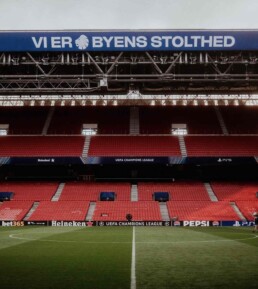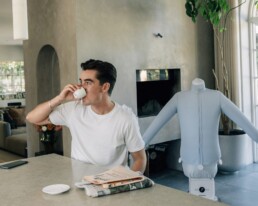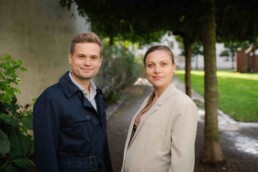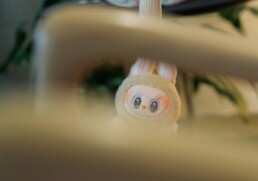F.C. Copenhagen goes green: Solar power to match half of Parken’s energy use
F.C. Copenhagen goes green: Solar power to match half of Parken’s energy use
🇩🇰 Du finder den danske version af denne artikel her.
Back in February, Andel and F.C. Copenhagen announced a broad partnership covering several areas. Part of the deal was a significant commitment to FCK’s women’s team – where Andel now features on the shirts – but the agreement wasn’t only about football. A key element was also making Parken more sustainable, and that ambition is now taking shape.
Going forward, a large share of the electricity consumption at both Parken and the Lalandia resorts will be matched by power from Andel’s new solar park in Vedde, Midtjylland.
Jacob Lauesen, CEO of F.C. Copenhagen, explains:
“For F.C. Copenhagen, it is important to actively take part in the green transition, which is why we have partnered with Andel, Denmark’s leading energy company. We are proud to take this important step in optimizing the energy profile of our home ground. At the same time, we are helping to increase the production of renewable energy in Denmark – and hopefully, this can also inspire others.”
“For F.C. Copenhagen, it is essential to play an active role in the green transition”
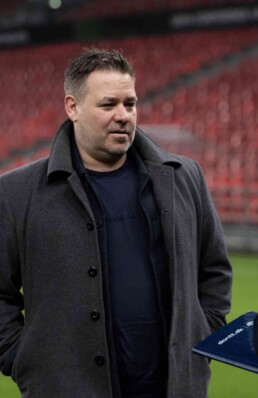
Jacob Lauesen, CEO at F.C. Copenhagen
Large charging hub around Parken
The new solar park in Vedde has just been connected to the Danish power grid and consists of more than 180,000 panels spread across an area equivalent to about 151 football pitches. Through the agreement – a so-called Power Purchase Agreement – roughly half of Parken Sport & Entertainment’s annual electricity consumption will be covered. This applies both to F.C. Copenhagen’s home ground and the three Lalandia resorts.
Although all electricity is mixed in the national grid, the deal ensures that a significant share of the consumption is matched by solar power. In this way, Parken is helping to drive demand for renewable energy, making it possible to build even more green capacity in Denmark.
The partnership with Andel is part of F.C. Copenhagen’s ForKBH initiative, which aims to strengthen the club’s social engagement and contribution to the capital.
Charging stations have already been installed around Parken, making it home to the largest EV charging hub of any Danish venue. Additional energy-optimization initiatives are expected to follow in the near future.
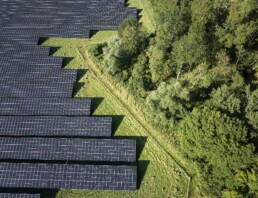
The local response has been overwhelmingly positive
Beyond generating electricity, Andel has worked to make the solar park more than just rows of panels. The Vedde site now includes about seven kilometers of walking trails, a viewing tower, and new planting around the facility. The goal has been to give something back to the local community – and it seems to have succeeded.
Henrik Bo Christensen, who lives right next to the solar park in Vedde, told Danish broadcaster DR:
“You’re skeptical at first, because you don’t really know what it will mean. You wonder – how close will it be? Will it be noisy? I had a lot of concerns.”
But his impression has changed after the process and Andel’s communication:
“Much of the fear I had has proven to be unfounded.”
Good neighborly relations are always worth striving for. Just ask the people of Østerbro and the residents of Brumleby – but that’s a different story.
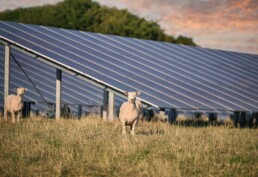
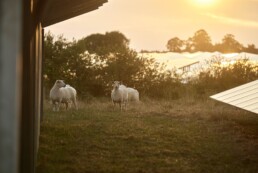
WEEKLY BRIEF
Stay updated on the most exciting stories, tips, and interviews.
Sign up for our newsletter and get it all delivered straight to your inbox.
Already 55,500+ subscribers on the list. We send out updates once a week!
Iconic Brand in Copenhagen: How Sebago Brings People Together Through Culture and Craft
Iconic Brand in Copenhagen: How Sebago Brings People Together Through Culture and Craft
🇩🇰 Du finder den danske version af denne artikel her.
Sebago, the American-Italian brand founded in 1946 and best known for its iconic boat shoes and classic loafers, was in the spotlight last week. Today, the brand is focused on connecting its heritage with a modern lifestyle – a mission that was front and center during a recent visit to Copenhagen by Sebago’s creative director, Marco Tamponi.
Over a lunch, Tamponi presented this year’s Sebago book, which has become an important and popular tool for showcasing the brand. He also shared the next chapter of the Sebago Yacht Club – a project that has grown over the past few years from a social media community into an international network of iconic locations, collaborations, and people who share the same passion.
“Today, the Sebago Yacht Club includes collaborations with some of Europe’s most historic restaurants, wine bars, and beach clubs”
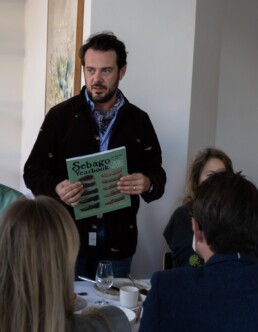
Marco Tamponi, Creative Director at Sebago
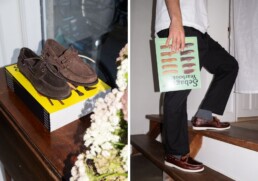
The Sebago Yacht Club is more than just a digital community
Launched three years ago as a digital community, the Sebago Yacht Club has since moved into the real world – a trend a few brands in Denmark have also successfully embraced. Everyone wants it, but few manage to pull it off.
Today, the Sebago Yacht Club includes collaborations with some of Europe’s most historic restaurants, wine bars, and beach clubs. The common thread is authenticity, quality, and a distinctive atmosphere. Here are a few examples, as Marco Tamponi shared.
In Italy, Bagni Fiore on Paraggi Bay has joined the club, where staff wear Sebago uniforms, including polos, sunglasses, and the iconic Portland shoes. In Milan, Pasticceria Cucchi received a special version of Sebago’s Dan penny loafer – featuring an imprint of the patisserie’s façade and the city’s legendary panettone. In Verona, the historic Antica Bottega del Vino collaborates with Sebago, where staff wear exclusive orange leather loafers. From the wine bar Hijos de Javier in Barcelona to the restaurant boat Riviera Fuga in Paris, Sebago has designed both shoes and uniforms for staff for the summer 2024 season.
“The print run has doubled since the last edition”
All of these stories are collected in Sebago’s annual book – a kind of yearbook that not only showcases the collections but also documents the people and places the brand collaborates with. It serves as a cultural statement, underlining Sebago’s ambition to be more than just shoes. Marco also shared that the book’s print run has doubled since the last edition.
During his visit to Copenhagen, Marco reflected on how the city fits into this mission: a region that, like Sebago, combines functionality, quality, and a relaxed approach to style.
In addition to these collaborations, Sebago is also launching new models as part of the Yacht Club universe. This includes the Hurricane sneaker, a modern reinterpretation of the brand’s maritime DNA, as well as new versions of the classic loafers in special designs.
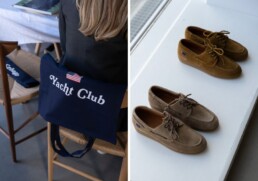
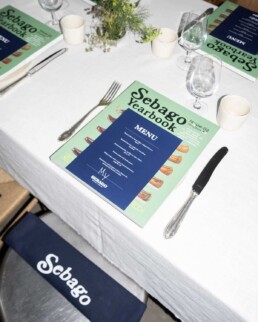
WEEKLY BRIEF
Stay up to date with the most exciting stories, tips, and interviews. Subscribe to our newsletter and get everything delivered straight to your inbox. Already 55,500+ subscribers on the list. We send it out once a week!
From Student Idea to Global Success: Now Sold in 40 Countries and Expanding to the US
"From Student Idea to Global Success: Now Sold in 40 Countries and Expanding to the US"
🇩🇰 Du finder den danske version af denne artikel her.
From long days at Copenhagen Business School and working at a law firm to building an international company present in more than 40 countries — that’s the journey of William Friis and Scanovus. The idea came when Friis realized how much time a simple task like ironing could steal from an already busy schedule. Why not create a smarter solution that saves time and makes everyday life easier?
That question sparked the launch of Scanovus and its first automatic ironing machine. Since then, the company has grown at remarkable speed and is now opening a U.S. warehouse to get closer to its customers. Throughout the journey, one philosophy has remained unchanged: never accept the status quo.
In this interview, William Friis shares how he turned an idea into reality, the countless prototypes that paved the way, and the social media breakthrough that propelled Scanovus into the global spotlight. He also reflects on where the company is headed in the next five years — and why its core mission will always be about giving people back their most valuable resource: time.
“The inspiration came from the methods used at dry cleaners, but I wanted to create a smaller, more user-friendly solution for private homes”
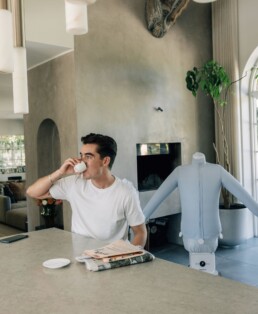
William Friis, Founder at Scanovus
William, what was the idea behind Scanovus, and how did it all begin?
“The idea came while I was studying at Copenhagen Business School and working at a law firm, where wearing a freshly pressed shirt was part of the daily routine. I quickly realized just how much time such a seemingly small task could consume. Setting up the ironing board, waiting for the iron to heat, and wrestling with wrinkles felt unnecessarily complicated and time-consuming — especially when my schedule was already packed with studies, work, and a social life.
That’s when it struck me: why not build a machine that could do it for me? The inspiration came from the techniques used at dry cleaners, but my ambition was to create a smaller, more user-friendly solution for the home. That became the starting point for Scanovus and our very first automatic ironing machine.”
“The process is a close collaboration between our team, skilled engineers, and the production side”
What does the process look like when developing a new product — from concept to ready-for-shelf reality?
“We operate under a very clear philosophy: we never accept the status quo. Our bestseller, the Automatic Iron 3.0, is the result of five years of continuous improvement.
I’m not an engineer, but I know exactly how the final product should work for the user. That’s why the process is a close collaboration between our team, skilled engineers, and the production team. It can be a long and demanding journey, often involving testing prototypes, tearing them apart, and starting over. Typically, it takes 6–12 months before we can hold a finished product that we are fully satisfied with.
Just a few weeks ago, I visited our factories in China to review new prototypes and brainstorm with our partners. These are intense days filled with exchanging ideas, sketches, and concepts — and sometimes completely turning everything upside down. It’s challenging work, but it’s exactly this effort that allows us to deliver products we are proud of and that truly raise the standard.
We don’t develop products just to optimize features. At Scanovus, the core mission is to give people time back. Today, time is one of the most valuable resources — and paradoxically, often the one we have the least of. That’s why we always ask ourselves: does this product free up time for the user? If the answer isn’t a clear yes, we go back to the drawing board.”
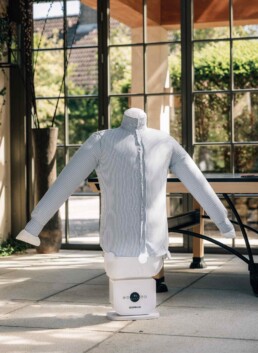
“In just a few years, we have grown from Denmark to more than 40 countries”
What’s the status? How’s it going?
“It’s going really well, but it has also been intense. In just a few years, we’ve expanded from Denmark to more than 40 countries. Demand continues to grow, and in 2025 we’ve repeatedly experienced products selling out before they even reached our warehouses.
This growth has forced us to rethink our business from A to Z. We’ve had to scale up production, optimize logistics, and expand with new warehouses. We’re now opening a warehouse in the U.S., an important step that brings us closer to customers there and allows for even faster delivery. Our growth is driven by international markets, which means we constantly have to think globally and invest in solutions that can keep up with demand.
One of the things I’m most proud of is that we’ve maintained our customer service throughout this journey. Rapid growth has meant far more inquiries and intense pressure, requiring countless hours, tremendous effort, and a dedicated team. Yet we’ve never compromised on our goal: that every customer should receive service that is personal, efficient, and leaves a positive impression of both the experience and the brand. I’m particularly proud that we haven’t just maintained this level, but have actually strengthened it along the way.”
“Our customer base is broader than you might think”
Who are your typical customers?
“Many people probably picture our classic profile: a man in his 30s or 40s who wears a shirt daily and has a busy schedule. In reality, our customer base is much broader.
We see families where the machine eases the burden of everyday chores. We see young people, like I was back then, who find ironing an overwhelming task in a hectic life. We have older customers who appreciate being able to manage ironing without physical effort. And we have many women who both use the product themselves and buy it as a gift.
For me, this shows that it’s not just about shirts. It’s about eliminating a time-consuming task and making everyday life a bit easier. When customers tell us they’ve started wearing shirts again because we’ve made it simple, I know we’ve hit something important.
You’ve experienced huge success on social media. Was that part of your strategy from the start?
“No, actually not. For a long time, we struggled to find our path on social media. We spent nearly four years experimenting with different formats without much breakthrough.
Everything changed when we started posting simple, handheld videos showing the product in use. Nothing staged — just real. It resonated with people because they could relate to both the problem and the solution.
Within a few months, we grew from about 2,000 followers to nearly 140,000. One of our first viral videos now has over 26 million views and more than 700,000 likes. I still remember the feeling of seeing traffic explode on our webshop. It was a turning point for us.
But although it may look like an ‘overnight success’ from the outside, the truth is that it’s built on five years of persistent work. Many trials, many mistakes, many hours. The organic growth we see today is the result of never giving up.
Looking five years ahead, where do you see Scanovus?
“In five years, I see Scanovus as an internationally recognized brand found in over a million homes. We will have a broader portfolio of smart household products and be known as the company that makes everyday life easier.
Our mission will remain the same: giving people back their time. If we can continue developing products that free up time for family, experiences, and what matters most, I’m convinced we can go much further than we can imagine today.”
WEEKLY BRIEF
Culture, business & inspiration — straight from Copenhagen to your inbox. Join over 55,500 subscribers! We send out updates once a week.
Two Icons Unite: “Exploring New Dimensions of Flavor”
Two Icons Unite: “Exploring New Dimensions of Flavor”
🇩🇰 Du finder den danske version af denne artikel her.
The Macallan is at once historic and modern. While the distillery draws on more than 200 years of tradition, it remains celebrated for its innovation and vision. What makes The Macallan truly fascinating is its ability to unite product development, marketing, and communication—while forming world-class partnerships across industries. Drawing inspiration from a company that has proven its worth for two centuries is almost inevitable. After all, anyone can make an impact in a single season—but doing so for 200 years requires something truly exceptional.
Now, that tradition of collaboration continues.
The Macallan has unveiled the latest release in its annual Harmony Collection—a limited edition single malt created in partnership with the British luxury tea brand JING. The release, Inspired by Phoenix Honey Orchid Tea, celebrates both The Macallan’s single malt heritage and JING’s exclusive single garden teas.
The whisky is inspired by the rare Phoenix Honey Orchid tea from Guangdong, China—an aromatic oolong with notes reminiscent of dessert wine and exotic fruits. It is predominantly matured in sherry-seasoned American oak casks, complemented by European oak and a subtle proportion of bourbon casks. The result is a rich flavor profile layered with peach, apricot, floral honey, tropical fruits, caramel, and sweet oak.
Two crafts deeply rooted in nature, tradition, and time

“Our collaboration with JING is a celebration of the many parallels between whisky and tea”
The whisky is inspired by the rare Phoenix Honey Orchid tea from Guangdong, China—an aromatic oolong with notes reminiscent of dessert wine and exotic fruits. It is predominantly matured in sherry-seasoned American oak casks, complemented by European oak and a subtle proportion of bourbon casks. The palate reveals layers of peach, apricot, floral honey, tropical fruits, caramel, and sweet oak.
Jaume Ferras, Creative Director at The Macallan, says:
“Our collaboration with JING celebrates the many parallels between whisky and tea—two crafts deeply rooted in nature, tradition, and time. Working with JING has allowed us to explore new dimensions of flavor and storytelling, creating a whisky that is both innovative and intimately connected to its origins.”
Melanie Tricklebank, CEO of JING, adds:
“At JING, we draw inspiration from the unique origins and craftsmanship behind each tea. It is a pleasure to collaborate with such an exceptional brand and to see how The Macallan embraces the quality and artistry our tea producers represent—those who drive our mission to redefine what tea can be. This partnership with The Macallan is a true meeting of minds and traditions.”
Packaging Crafted from Recycled Tea Leaves
The Macallan Harmony Collection is an annual limited edition release, with packaging always crafted from sustainable materials. This year, the presentation box is made from recycled tea leaves.
This approach reflects a philosophy of creating beauty from resources that have reached the end of their natural lifecycle.
Previous releases have included collaborations with Cirque du Soleil, the Roca brothers, and Stella & Mary McCartney. With Inspired by Phoenix Honey Orchid Tea, The Macallan continues its tradition of combining iconic craftsmanship with bold, inspiring partnerships.

WEEKLY BRIEF
Culture, business & inspiration — straight from Copenhagen to your inbox. Join over 55,500 subscribers! We send out updates once a week.
Hairlust Acquired by Global Giant: A New Chapter for Danish Beauty
Hairlust Acquired by Global Giant: A New Chapter for Danish Beauty
🇩🇰 Du finder den danske version af denne artikel her.
At dontt.dk, we’ve followed Hairlust closely from the very beginning. Back in 2021, we spoke with Rasmus Serup about the company’s ambitions. At the time, he said Hairlust aimed to establish a strong presence in 30 different countries. Bold words for such a young brand — but they became reality.
Hairlust was founded in 2017 by the Danish duo Sofie Jalk Tidemand and Rasmus Serup, both in their early twenties when they returned home to Denmark.
They started with just a single product: a hair supplement, and it took off from day one. The product was strong, and they already had the “key” to scaling it successfully. Today, they develop and sell a wide range of hair products, primarily produced in Denmark, with a focus on natural hair care and styling. In just five years, Hairlust has generated — yes, generated — a profit of 45 million DKK.
"We see TOCG as the perfect partner to help us take Hairlust to the next level — together”
Since then, Hairlust has grown into one of Denmark’s most successful beauty brands, with international reach, a strong B Corp certification, and a clear identity in the global shift toward natural beauty.
Now, the company is taking its next step. The international group The Organic Consumer Group (TOCG) has acquired 100% of Hairlust. With this acquisition, TOCG adds another fast-growing brand to its portfolio — while providing Hairlust with a platform to unlock its full global potential.
The management team and employees will continue to operate out of Denmark, and co-founders Rasmus Serup and Sofie Jalk Tidemand are reinvesting part of the proceeds back into TOCG.
Rasmus Serup, CEO and Co-founder of Hairlust, gives insight into the sale process to dontt.dk:
“When Sofie and I started Hairlust eight years ago, it was a bit of a hobby project, and we had no prior experience running our own business. We learned as we went, but as a small company, it was challenging to attract top-level talent and the right profiles. We’ve long felt the need to be part of something bigger, bringing in new perspectives and expertise. The decision to sell has matured over the past couple of years, as we’ve had many productive conversations with potential buyers. At its core, it’s about taking Hairlust to the next level and realizing its full potential.”
Rasmus continues on the new owners:
“We are incredibly excited to join TOCG and proud to become part of a group of strong international brands that share our passion for natural and sustainable beauty. With TOCG behind us, we gain access to new resources, knowledge, and networks that will help Hairlust flourish to its full potential. We see TOCG as the perfect partner to help us take Hairlust to the next level — together.”
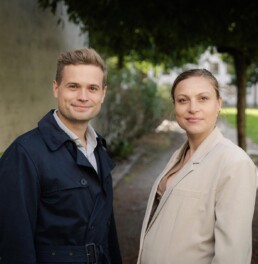
Rasmus Serup & Sofie Jalk Tidemand – Founders, Hairlust.
“The acquisition marks an important milestone in our ambitious growth strategy”
The Organic Consumer Group (TOCG) was founded in 2022 with a clear mission: to become one of Europe’s leading players in natural beauty. The group already owns brands such as La Saponaria and Dr Organic, all sharing key traits like an organic focus, B Corp certification, and a dedication to “clean beauty.”
Henri Vindevogel, President and Co-founder of TOCG, says:
“We are thrilled to welcome Hairlust to the TOCG family and look forward to supporting the team through the next phase of growth. This long-term partnership will not only strengthen our D2C capabilities but also add a segment with significant potential in natural hair care to our portfolio.”
An Driessens, CEO of TOCG, adds:
“This acquisition marks another important milestone in our ambitious growth strategy. We warmly welcome the Hairlust team to TOCG and look forward to working closely together to scale the brand and expand its international presence. With this step, TOCG’s revenue will exceed €60 million, bringing us closer to our goal of becoming a leading player in natural beauty across Europe.”

WEEKLY BRIEF
Culture, business & inspiration — straight from Copenhagen to your inbox. Join over 55,500 subscribers! We send out updates once a week.
Nordic Strong rebrands as NRTHRN Strong ahead of New York launch
Nordic Strong rebrands as NRTHRN Strong ahead of New York launch
🇩🇰 Du finder den danske version af denne artikel her.
The last time we spoke with Nicoline Roth was back in February, when she and the team behind Nordic Strong were deep in preparations for their biggest adventure yet: New York. The plan was to introduce their unique concept, The Nordic Trainer – a machine rooted in Nordic training principles – to one of the world’s most competitive fitness markets.
Now, just months later, they are on the verge of opening their first U.S. studio, right in the heart of New York’s Flatiron District – long considered the epicenter of boutique fitness and wellness.
Alongside the opening, Nicoline also shares a major announcement: Nordic Strong is rebranding to NRTHRN Strong as part of a global strategy.
We spoke with co-founder Nicoline Roth, now of NRTHRN Strong.
"Our pop-up has been the perfect way to introduce ourselves and has given us a strong springboard for the New York opening"
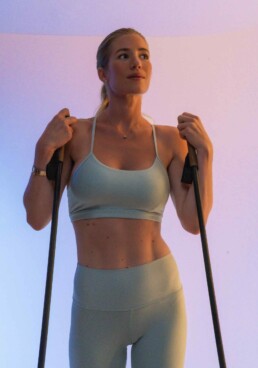
Nicoline Roth, Co-founder NRTHRN Strong.
Nicoline, the opening is just around the corner. What does the final stretch look like?
“We’re in the middle of putting the finishing touches on the studio while also planning a series of events leading up to our official opening on October 8. I’m an ambassador for On, so our very first event will be in collaboration with them – a brand that feels like the most natural fit to kick things off with. We’re bringing together On’s U.S. ambassadors for a short run, which we’ll wrap up with a session in the studio. Beyond that, we have several exciting events lined up to build energy and awareness around the opening. Of course, there are a lot of details to handle at this stage, but I actually feel we’re in a really good place. And we’ve been fortunate not to run into any major delays during the build-out.”
How has the response from New Yorkers been to your pop-up?
“The feedback has been overwhelmingly positive. We’ve welcomed a broad mix of people – both locals from the Hamptons and New Yorkers who stopped by throughout the summer. I’ve seen a lot of curiosity and strong support for a completely new and different concept. Our pop-up has been the perfect way to introduce ourselves and has given us a strong springboard for the opening of our first New York studio.”
“Americans are truly great at rallying behind new ventures”
What has surprised you the most in encountering the U.S. fitness industry?
“It hasn’t really come as a surprise, because I sensed it even before we started here, but I’m still deeply impressed by the incredible support and openness toward new initiatives. Americans are truly great at rallying behind new ventures. They’re also very generous in creating connections and introducing you to new people. As a new company, being met with that warmth and openness means the world – and it’s something I’m extremely grateful for.”
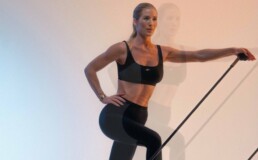
Rebranding is a natural step on our path to becoming a global brand
You’ve decided to rebrand as NRTHRN Strong ahead of the opening – why?
“The name NRTHRN Strong is a natural step in our journey toward becoming a global brand. We felt this was the right moment to evolve into a more universal and distinctive identity. NRTHRN Strong still reflects our Scandinavian heritage, but it also resonates with a global audience as we prepare to expand internationally. At the same time, the name embodies the unique concept we are bringing to the market.”
What does NRTHRN Strong stand for?
“NRTHRN Strong stands for Northern Strong. The name is inspired by the strength, simplicity, and resilience we associate with the Nordic region. It points back to our roots in Copenhagen while also sending a clear signal of a brand designed to bring people together across borders.”
Will the brand continue to carry its Scandinavian influence?
“Absolutely. Scandinavian design and philosophy remain at the core of everything we do: simple, disciplined, and holistic. The new name allows us to stay true to those roots while reaching out to a broader audience.”
"The energy of building something across two continents at the same time is truly unique"
How does your everyday life look right now – balancing Denmark, the US, and preparations for the opening?
“My days are intense – they start early and end late. I’m often in touch with the team in Copenhagen as early as 6–7 in the morning, and from there the day continues with work at the New York studio, meetings, and planning. It’s demanding, but I love every minute of it. The energy of building something across two continents at the same time is truly unique, and I feel privileged to live this journey.”
And what about the studio back home?
“My siblings are running it, and they’ve really stepped up and taken full responsibility. Of course, there was a transition period where we had to establish the right structure, but they’re doing a fantastic job. The studio continues in the same spirit and with the same family-driven atmosphere it has always had – and it means a lot to me to know that our members back home are in good hands.”
WEEKLY BRIEF
Culture, business & inspiration — straight from Copenhagen to your inbox. Join over 55,500 subscribers! We send out updates once a week.
Delaney: “We must remember to check in on each other” – FCK and the Red Cross unite against loneliness
Delaney: “We must remember to check in on each other” – FCK and the Red Cross unite against loneliness
🇩🇰 Du finder den danske version af denne artikel her.
When F.C. Copenhagen face Silkeborg IF in Parken on September 21, the team will take to the pitch in special edition shirts. For one night only, the club and its main partner Unibet have handed over the front of the jersey to the Red Cross.
The match is dedicated to raising awareness around mental health in Denmark and encouraging everyone to ask a simple but powerful question: How are you really doing?
Lars Gade Nielsen, General Manager at Unibet (FDJ United), explains:
“Far too many people feel left out. According to the latest figures, one in five young Danes between the ages of 16 and 26 feel lonely. It’s a serious development that calls for both attention and action. We want to contribute to this important conversation, which is why the Red Cross logo will appear on the shirts for this match instead of Unibet’s.”
One in five Danes aged 16 to 26 struggle with loneliness

Delaney: “How are you really doing?”
Mental health is also a central part of daily life within F.C. Copenhagen’s squad.
Captain Thomas Delaney emphasizes the importance of players being able to be open with one another:
“We have a strong group where we can be open and honest with each other. It’s absolutely crucial that we feel good in order to perform – even in a high-pressure environment. Psychological safety means you can give of yourself – both when things are going well and when they’re difficult,” Delaney says.
He adds:
“Football can be a tough and uncompromising elite environment, but in reality, it’s about having the right people around you who take responsibility for one another. And that requires that we constantly communicate and remember to ask: How are you really doing?”

F.C. Copenhagen aims to use its platform
“We have a large platform and an enormous reach. We need to use it to make a difference – not only on the pitch but also in society. It compels us to focus on the tougher aspects of life, and mental wellbeing is essential for all of us,” says F.C. Copenhagen’s CEO, Jacob Lauesen.
At the Red Cross, demand for support for Danes facing difficult life circumstances has risen significantly.
Secretary General Anders Ladekarl welcomes the partnership:
“We know that a sense of belonging is crucial for our wellbeing. Yet far too many people in Denmark lack a community they can be part of. That is why our work at the Red Cross focuses on creating relationships and presence that strengthen and bring joy. We are therefore extremely grateful for and proud of the collaboration with F.C. Copenhagen and Unibet, as we know that the effort and visibility will have a real impact.”
After the final whistle, the specially designed jerseys will be auctioned, with all proceeds going directly to the Red Cross’s work promoting mental wellbeing and preventing loneliness.
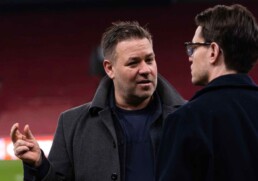
WEEKLY BRIEF
Culture, business & inspiration — straight from Copenhagen to your inbox. Join over 55,500 subscribers! We send out updates once a week.
Tiger of Sweden strengthens its Danish presence
Tiger of Sweden strengthens its Danish presence
🇩🇰 Du finder den danske version af denne artikel her.
Tiger of Sweden is far from a newcomer in Scandinavian fashion. The story begins back in 1903 in the Swedish town of Uddevalla, where Markus Schwarmann and Hjalmar Nordström founded a brand that was then simply called Tiger. Its focus was straightforward: classic trousers for the mature gentleman.
That image shifted dramatically in the 1990s, when Tiger expanded into suits, appealing to a younger, urban audience seeking style that was both sleek and modern. Since then, the brand has grown to include clothing, shoes, and accessories such as eyewear, and it is now sold across Europe and Canada.
Since 2003, Tiger of Sweden has been under Danish ownership through IC Companys (now IC Group), making its connection to Denmark more than symbolic. And now, that link is about to get even stronger.
Tiger of Sweden is deepening its presence in Denmark through a new partnership with CPH Fashion Group.
CPH Fashion Group is known for working closely with leading menswear brands and for its sharp focus on tailoring, making Tiger of Sweden a natural fit for its portfolio.
With this new arrangement, the brand moves closer to its Danish audience—retailers, press, and the many men who have long chosen the brand for its unique blend of classic craftsmanship and contemporary style.
"The brand’s ties to Denmark run deeper than mere symbolism"
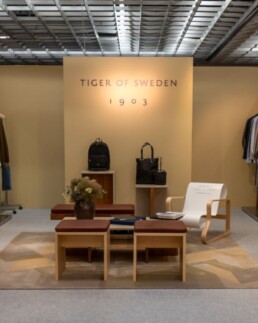
“Denmark has long inspired us with its effortless style”
Steve Kirchner, Global Wholesale Director at Tiger of Sweden, says:
“Denmark has long inspired us with its effortless style and forward-thinking approach to design. We are thrilled to partner with one of Scandinavia’s leading fashion distributors to showcase our collections and strengthen our relationships with such a dynamic, style-conscious audience.”
Anders Rex, CEO and Founder of CPH Fashion Group, adds:
“Partnering with Tiger of Sweden is a significant milestone for CPH Fashion Group. Their dedication to craftsmanship and unique interpretation of Scandinavian elegance perfectly aligns with our vision of bringing exceptional menswear to the market. We look forward to working together and offering a brand that complements our portfolio while reflecting the values of modern, international design.”
The partnership officially launches with Tiger of Sweden’s Pre-Fall 2026 collection, presented at the brand’s showroom on Antonigade in Copenhagen. The collection celebrates the brand’s tailoring heritage while introducing a fresh, contemporary take.
We can’t wait to share it with you here on dontt.dk
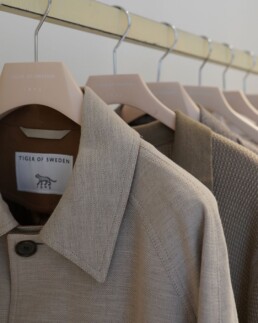
WEEKLY BRIEF
Culture, business & inspiration — straight from Copenhagen to your inbox. Join over 55,500 subscribers! We send out updates once a week.
Organic growth has taken SAYSKY from Copenhagen to the world
Organic growth has taken SAYSKY from Copenhagen to the world
🇩🇰 Du finder den danske version af denne artikel her.
This weekend, Copenhagen is all about running with the CPH Half Marathon – and who better to talk to than the Danish frontrunners in running apparel, Copenhagen-based SAYSKY. Sales are booming in Denmark, and the brand has truly broken through internationally.
In Japan alone, they are represented in more than 90 stores, with an even stronger presence in Germany and the UK. Most recently, they have seen success with a global collaboration with PUMA.
Behind the company is Lars C. Pedersen, founding CEO of SAYSKY – we sat down with him one afternoon in Copenhagen.
“Our journey has been organic, where we’ve built layer upon layer rather than taking those big, artificial leaps”
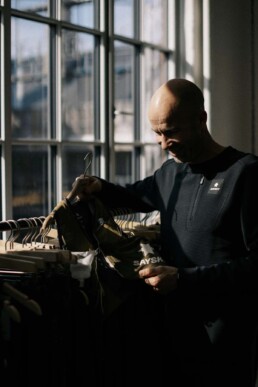
Lars C. Pedersen, founding CEO at SAYSKY
Lars, we’re heading into a major Copenhagen event: the CPH Half Marathon. Let’s start there – how do you see the running culture in Copenhagen and Denmark right now?
“Over the past 15–20 years, Denmark has built a strong running culture, and in Copenhagen especially, the last 4–5 years have given it a life of its own with running clubs and great communities. I’ll be running CPH Half myself, and I’m really looking forward to it – there’s always something special about having such a strong home base, where you know so many people along the course.
Copenhagen is right at the top of the ‘sub-tier’ races just below the world’s biggest ones. The city’s size creates both a natural limitation and a unique intimacy. You’ll find people cheering along the entire route – which is not the norm for races – and that gives it a very special extra dimension.
Copenhagen is known for quality in general, and this race – together with the city’s broader running culture – is absolutely part of that story, something we can really be proud of as Copenhageners.”
“Denmark has always had a strong running culture, and in Copenhagen it has truly taken on a life of its own with running clubs and vibrant communities"
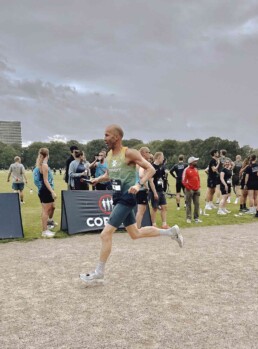
What does it mean for SAYSKY to have such a big event happening in the city?
“You always want to perform well on your home turf – and Copenhagen is ours. For SAYSKY, CPH Half means a lot. It’s a chance to showcase ourselves to the many runners from all over the world who come to the city. The fact that it’s such a high-quality event strengthens the culture, the sense of community, and puts Copenhagen on the global running map.
But it’s not just about us – we also want to contribute to the atmosphere and community. On Saturday we’re hosting our own social run, which already has close to 200 sign-ups. So come join us, even if you’re not running the half marathon.”
You founded SAYSKY 12 years ago. It’s a big question, but can you put a few words on your own journey?
“It’s a good and important question, because we’ve built so much along the way – but without ever losing ourselves in the process. Our journey has been organic, where we’ve consistently added new layers rather than taking those big, artificial leaps. We’ve improved, refined, and stayed true to our path from the very beginning.
Over time we’ve steadily expanded the collections, developed fabrics and functionalities, and today we offer a full premium range from head to toe. In the early days, many of our customers might only have had a single SAYSKY item in their wardrobe – now we often hear that they don’t run in anything else.”
“It’s a bit like good Danish design furniture – first and foremost, it has to be a good chair to sit in”
Is SAYSKY a brand for elites, everyday runners – or both? Who are you here for?
“It’s true that a lot of fast runners wear SAYSKY, but you absolutely don’t need to be an elite athlete to run in our gear. What we really connect with is the enthusiast – the runner for whom running means something, regardless of pace. It’s about a love for movement. It’s about passion. We’re here for the people who look up, smile at each other, and share the joy. SAYSKY athletes greet and support one another no matter who they are or where they come from – and honestly, it warms my heart every time I see that happen.”
So is your main focus on functionality?
“It’s a bit like Danish design furniture – first and foremost, it has to be a good chair to sit in. But of course, it should still look great, and often that’s what draws people in and makes it stay relevant. That’s how we see running apparel too. We put care into everything we create. Because our growth has been organic, we’ve had the time to get every detail right – and that has really paid off.”
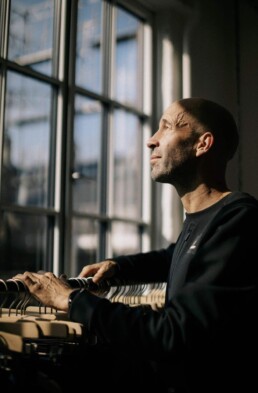
“From day one, we’ve had an international focus”
Where is your main focus commercially?
“We’ve always had an international focus. In fact, we had a webshop in English before we even had one in Danish. That’s why a large part of our sales has always come from outside Denmark – especially in Germany and the UK, followed by Japan, the US, the Netherlands, and Norway. These are typically markets with big, iconic races and very strong running cultures. Roughly half of our sales come through our own webshop, while the other half is via carefully selected, specialized stores.”
Earlier this year you launched a collaboration with PUMA that debuted in the US. What has that meant for you?
“That definitely stands out as something very special in our journey. It was a global launch – not just a local or national activation like you often see with other brands. It rolled out in Puma flagship stores all over the world, from São Paulo to Shanghai. The actual launch happened at Puma’s Fifth Avenue flagship in New York, with five massive screens blasting out PUMA x SAYSKY. The collection included 28 unique styles, including several running shoe models. That’s on a completely different level compared to just releasing a new colorway of a single product.
But honestly, what means even more to me is that the collection overperformed by 40% compared to Puma’s initial expectations. I’ve always been a believer in ‘underpromise, overdeliver,’ so it’s great to see the concept resonate so strongly and prove that SAYSKY really speaks the language of runners. We also had a big say in where the collection was distributed, making sure it landed in the best running stores worldwide – the kind of places where people really care about quality and design. That was crucial for us, because we never want to compromise how the SAYSKY brand is perceived.”
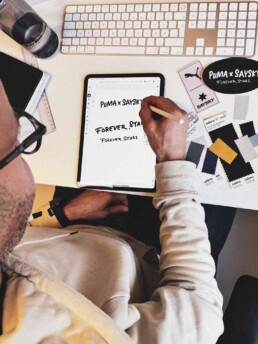
“I’m inspired by people who always have a positive outlook”
What keeps you personally driven?
“Honestly, I love sport. Some people enjoy popping champagne at a fashion event, but I’m looking forward to running the Chicago Marathon and testing our newly developed fabrics on a long run. That’s my drive. I also believe there are many great experiences ahead if we keep maintaining the high standards that have brought us this far. It feels like we’ve passed through the eye of the needle and are now out on the highway – the vehicle is running smoothly and fast – yet I think we’re good at keeping both hands on the wheel.
We’re now more than 25 employees, and I feel a strong responsibility to run the company responsibly, so no one gets squeezed because we’ve taken big risks. We’re a team of dedicated sports enthusiasts, and it genuinely makes me happy to see them attend national matches together, take morning swims, or just go for a run after work.”
Could you ever imagine selling SAYSKY one day?
“Some say everything is for sale in this world, haha. But it’s a bit like asking about the company’s overall ambitions. In sports, you might dream of running a marathon in 2:30, but it’s probably wise to start with 2:45 first. We focus on the present, and that’s what has brought us to where we are today. SAYSKY is like my first child – it wasn’t founded to become a growth rocket, but out of love for sport and the active lifestyle.”
Who inspires you personally?
“I’m inspired by people who always have a positive outlook, who are genuine, present, and at the same time diligent and meticulous. I don’t believe the easy path gets you very far.
Give me people who manage to turn energy and dedication into something excellent – those who do things with their heart because they can’t help it – those are the people I truly look up to. That’s probably also how I hope to be seen myself.”
WEEKLY BRIEF
Culture, business & inspiration — straight from Copenhagen to your inbox. Join over 55,500 subscribers! We send out updates once a week.
Labubu: From Small Shop to Billion-Dollar Brand
Labubu: From Small Shop to Billion-Dollar Brand
🇩🇰 Du finder den danske version af denne artikel her.
You’ve probably seen them on TikTok or in queues abroad: small plush toys with sharp teeth, big eyes, and expressions that are both cute and slightly creepy. They’re called Labubu – and they’ve become the latest global collector craze.
Before you start rolling your eyes at the hype, China, or whatever else, know that there’s actually a pretty fascinating entrepreneurial story behind the phenomenon.
Valued at over $40 billion
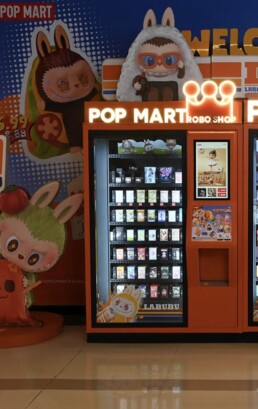
Pop Mart vending machines line the streets of China, turning Labubu into an instant collector’s craze.
Scarcity and gamification are key elements of the strategy behind the plush toy frenzy.
Sold DVDs and small gadgets to fellow students
Pop Mart, the company behind Labubu, started as a small toy shop in Beijing in 2010. The idea was simple: to sell designer figures in limited editions to a growing audience of young collectors.
In 2019, Pop Mart launched the first Labubu plush – and things quickly took off. So much so that the company’s founder, Wang Ning, is now counted among China’s wealthiest, with a fortune of several billion dollars.
Born in 1987 in Henan province, Wang Ning studied advertising at Sias University and graduated in 2009. During his student years, he experimented with selling DVDs and small gadgets to fellow students – an early lesson in understanding what young consumers want. After a brief stint at the tech company Sina, he was inspired by Hong Kong concept stores and founded Pop Mart the following year in Beijing.
The company is listed on the Hong Kong Stock Exchange and valued at over $40 billion. In the summer of 2025, Pop Mart announced that its half-year results were expected to be more than three and a half times higher than the previous year, while its stock price surged nearly 600 percent.
All thanks to the so-called Labubu.
Online succes med fysiske automater overalt
A Labubu originally costs no more than around $15–20. But because demand far exceeds supply, they are resold at crazy prices. In Denmark, for example, you can easily find cases where plush toys that cost about $15 in China are resold for much, much more – if you can even get your hands on one.
The scarcity is far from accidental. Pop Mart has made controlling availability a strategy. Instead of mass-producing, they hold back – creating the same kind of frenzy we see with sneaker drops or Apple launches.
But the Labubu craze isn’t just about scarcity. Pop Mart is a digitally native brand that has mastered social media and gamification.
Today, thousands of Pop Mart vending machines line the streets of China, letting people buy figures like a lottery. At the same time, an app lets fans “unbox” their plush digitally before it is delivered.
It’s no coincidence that TikTok is flooded with videos of young people tearing open the plastic bag, screaming with delight – or disappointment – depending on which Labubu they get.
So what now?
Is the Labubu plush a lasting icon, destined to stand alongside Pokémon, Funko Pops, and LEGO – or just another short-lived hype we’ll soon forget?
As my own daughter dryly observed: “The hype’s probably over soon, Dad.”
Maybe she’s right. Maybe not.

WEEKLY BRIEF
Culture, business & inspiration — straight from Copenhagen to your inbox. Join over 55,500 subscribers! We send out updates once a week.


